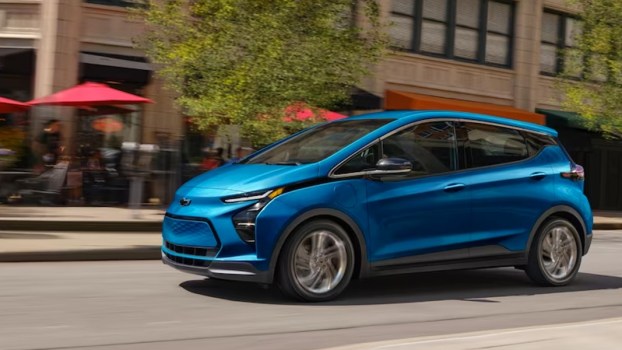
The Pros and Cons of Chevy Sticking With the Bolt EV and EUV
Despite rumors that the Chevy Bolt and higher-riding Bolt EUV were getting the axe to make way for a new lineup of Chevrolet EVs, it’s been confirmed by the automaker that the Bolt nameplate isn’t going to that great scrapyard in the sky. Instead, the Bolt nameplate is being prepped for a new generation. We have mixed feelings about the decision. Here are the pros and cons of Chevy retaining the Bolt moniker as a staple of its lineup.
A short history of the Chevy Bolt EV and EUV
The Chevrolet Bolt, not to be confused with the Volt plug-in hybrid sedan, debuted for the 2017 model year as a small all-electric hatchback, according to AutoEvolution. The Bolt EUV, short for “electric utility vehicle,” later debuted for the 2022 model year with slightly larger dimensions as an SUV variant.
The Bolt EV was a significant step forward for all-electric vehicles when it debuted. It offered 238 miles of range, which was notable for the time, and with a starting price of about $38,000, notably cheaper than many other EVs available.
The Bolt’s appeal continued to grow as the model aged. For starters, Chevy has continued to cut its price. The 2023 Bolt EV now starts at $27,495, making it the most affordable EV on the market. Simultaneously, its driving range grew to 259 miles, DC fast charging became standard equipment, and the Bolt EUV offered slightly better passenger space and more SUV-like looks.
However, as improved specs and pricing furthered the Bolt’s influence, it was concurrently riddled with recalls.
In November 2020, a recall was issued for 2017-18 Bolts for a potential battery fire risk when models were charged at or near 100%. In September 2021, GM recalled all Bolts for model years 2017-22 for another issue that could lead to battery fires. As such, Bolt owners received a long list of instructions for mitigating the risk, including not charging their vehicles above 90%, not letting the battery “run down,” and to park their Chevys outdoors and away from structures until a fix was rendered on their model.
Unfortunately for Chevy Bolt owners, another recall for over 100,000 models was issued later in 2021 for the potential fire risk associated with faulty front seatbelt pre-tensioners, according to Inside EVs, furthering the damage to the model’s reputation.
Still, the Bolt EV and EUV soldiered on. Both models are available for the 2023 model year in two trims, with prices starting at under $28,000 for a base 1LT Bolt and rising to a still affordable $33,295 for the top trim of the Bolt EUV.
After announcing that the Bolt would be discontinued to make way for Chevy to produce the upcoming Silverado EV, Chevrolet about-faced announced the Bolt would return for the 2025 model year riding on GM’s Ultium platform. The brand announced the nameplate would continue to focus on affordability in Chevy’s growing lineup of all-electric options.
The downsides of Chevrolet sticking with the Bolt nameplate
Chevrolet is taking an inherent risk in reviving the Bolt nameplate. For starters, the Bolt moniker is now about as synonymous with “recalls” as Lancia is to “rust.” We automotive journalists are partly to blame as we can’t seemingly write about the Bolt without mentioning its string or serious recalls. Still, we’re not alone, as many consumers undoubtedly make the same connection.
This has tarnished the Bolt nameplate in many’s eyes, and GM opting to keep the moniker alive will continue to associate the future EV with its checkered past.
Another downside, at least from Chevy’s perspective, is that the Bolt was reportedly being cut from the lineup as the brand introduced larger EV SUVs like the Equinox and Blazer. If the Bolt grows in size and potentially price, it might not be able to stand out against Chevy’s newer all-electric SUV options, thus creating consumer cannibalism among the brand’s EV offerings.
The advantages of Chevy keeping the Bolt lineup
We will wait to see the final details of the revised Bolt EV and EUV models, but if Chevy sticks with the model’s M.O. of providing an affordable and efficient EV, that could certainly be considered a win for all consumers. The Bolt will likely continue to serve as the entry point for Chevrolet’s EV SUV lineup. As such, it could remain one of the most affordable EVs on the market. The model being eligible again for the $7,500 EV federal tax credit will only broaden its pricing appeal.
The revamped Bolt lineup is likely to be attractive for those who want a subcompact EV option rather than the larger Blazer or Equinox from GM’s ranks. GMC, for instance, has only announced plans to electrify its larger trucks and SUVs, according to Car and Driver. Therefore, the Bolt could occupy the essential entry-level option for consumers looking to switch to all-electric power.
Much remains to be seen about what the next Bolt and/or Bolt EUV will be, but it’s a mixed bag for the future prospects of the nameplate and model.




